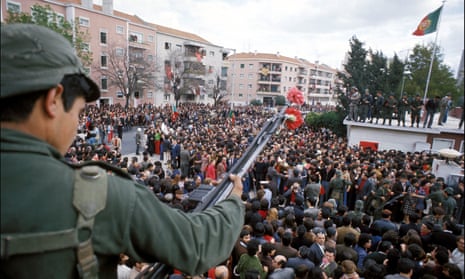Alexis Petridis’s article (Abba, cabaret and smug marionettes: the 1974 Eurovision song contest reviewed!, 5 April) didn’t mention the only interesting aspect of the 1974 Eurovision song contest: the Portuguese entry. Paulo de Carvalho’s E Depois do Adeus was played on Lisbon radio on the night of 24 April 1974, and was the signal for the start of the revolution that ended 50 years of fascist dictatorship.
Chris Keil
Marloes, Pembrokeshire
Clive James’s TV review for the Observer on 14 April 1974 provides some balance to gushing tributes to Abba at Eurovision: “Representing Sweden were Abba, a two-girl and two-man outfit with a song called Waterloo. This was built on a T. Rex riff and delivered in a Pickettywitch style that pointed up the cretinous lyric with ruthless precision.”
John Lovelock
Bristol
